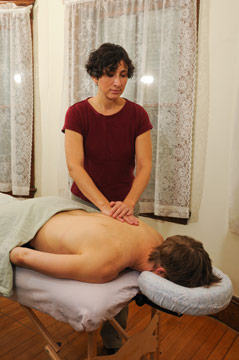About Massage

What is Massage?
Deep tissue, therapeutic massage, like the type Tamar has been trained to do, is a manual working of the soft tissue of the body to facilitate relaxation and tension reduction. Massage sessions may also include education as to how you can better take care of yourself on your own.
How does massage work?
Unfortunately, there is less scientific research that we would like that shows how massage achieves the results that it does. We know for sure that massage locally increases circulation. We also know that massage feels good and therefore triggers a relaxation response and the release of endorphins. Also, there is a neurological system in the body(called golgi tendon organs) whereby applying pressure to certain places along a muscle can encourage it to relax.
We all need to relax.
When excess tension is held in the body over time, the result is discomfort, fatigue and even pain. Extended periods of stress can also have a negative effect on the body. When we spend too much time under stress, our digestion, growth, immune function and other systems are compromised. When we spend too much time in the same position, our muscles become shortened. This decreases local circulation and creates irritation in the muscles, which often makes them even tighter.
Massage allows for the body to relax by manually lengthening tight muscles, locally increasing circulation and by forcing you to take a break for a little while. Besides, it just feels wonderful. When we are in a relaxed state, our bodies function more efficiently, we feel less fatigued, we have less pain, we are more energized, and have better range of motion. Being relaxed can even help us think more clearly.
Who Should Get Massage?
Anyone can benefit from massage. People come for many different reasons and with a wide range of frequencies, from a once-a-year treat to once a week injury treatments. No matter how often you get a massage, you will always receive the emotional and physical benefits of relaxation. Making lasting changes in your tension levels requires that you receive massages more often than for relaxation only.
What to look for in a massage therapist.
Adequate training is one of the most important things to look for when seeking a massage therapist. Your therapist should be licensed by the state of Massachusetts and insured. The American Massage Therapy Association and the state licensing board require a minimum of 500 hours of initial training. Don't be afraid to ask questions! Ask your therapist if they attended an accredited school. COMTTA is a highly regarded accrediting agency of massage schools. Ask how long they have been practicing, what kinds of techniques they do, how much continuing education they’ve done, etc.
Should massage hurt?
Absolutely not! Massage does not have to be painful to make a difference. Everyone can tolerate different levels of pressure and a good, well-trained massage therapist should be able to accommodate a wide variety of pressure preferences. Don't ever hesitate to tell a massage therapist if they are hurting you. Occasionally, people will feel a little sore the next day after a massage, but this mild soreness should pass quickly. Always tell the therapist if you experienced soreness after your session so that they can adjust their pressure the next time they see you. Drinking plenty of water after a massage will often help to minimize any feelings of soreness.